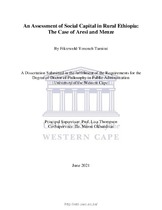| dc.description.abstract | This dissertation explored the degree and distribution of social capital forms-social networks,
volunteer associations, generalized trust, particularized trust and norms of reciprocity in rural
Ethiopia. It aims to contribute to the academic understanding of social capital formation in Africa.
Whereas the extent of literature focused on uncovering difference in the distribution of social
capital at macro, meso and micro levels, this dissertation instead unpacks how political and
economic conditions in rural Ethiopia shape the extent of the different forms of social capital at
different levels.
Aresi and Menze are selected for the case-study based on their representation of rural Ethiopia's
ecological, language, and ethnicity, historical and religious diversity. A household survey (n =
735) was conducted to uncover the distribution of social capital forms at the individual, regional
and aggregate levels. Eight focus group discussions and ten key informant interviews were
conducted to unpack why the different forms of social capital unfold the way they do. The
qualitative interviews were also used for validating the result of the household survey by
uncovering how institutional and structural factors reconstituted and redefined at the local level
and translated into social capital formation.
The empirical result revealed that social networks and norms of reciprocity are the most important
social capital apects in the study areas. At the same time, trust relations and formal networks
(volunteer organizations) are the least important aspects of social capital. However, over time,
community-organization has become an alternative venue where community members relate and
support each other. Thus, network-based and community-based social capital are the principal
social capital forms in the study areas. This result is largely inconsistent with the previous studies
that have been conducted in developed and democratic countries which have asserted generalized
trust and impersonal civic organizations as the major forms of social capital, rather than localized
and interpersonal forms of social capital. The fact that different forms of social capital are present
in different contexts with different levels of importance shows that forms of social capital do not
necessarily articulate together. Moreover, the variation in the relative importance of social capital
forms shows that the production of social capital is shaped by the prevailing political and economic
conditions. Thus, this dissertation makes the case that it is necessary to distinguish
among the different forms of social capital both in theory and practice. | en_US |

